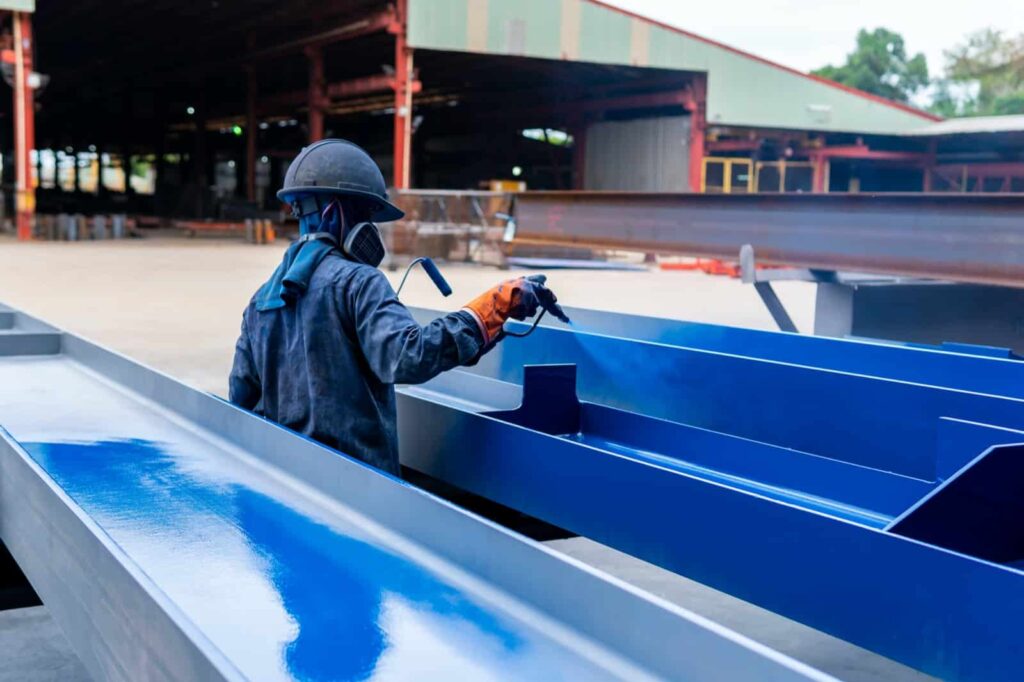What is Industrial Painting?
Are you considering taking on a big painting project for your business or industrial property? Industrial painting is an essential part of the maintenance and protection process for buildings and resources, protecting surfaces from dirt, corrosion, fading, and wear.
Knowing what industrial painting entails can help you determine if your business needs to consider investing in it. Let’s take a closer look at what industrial painting entails and how it could benefit you.
Overview of industrial painting
What is industrial painting?
Industrial painting is a specialized form of painting that protect surfaces from corrosion, abrasion, and other environmental factors. It requires greater expertise than residential or commercial painting due to industrial projects’ larger scale and complexity.
It often involves complex surface preparation methods such as sandblasting, abrasive blasting, and specialized coatings to achieve the desired results.
Industrial painters must also consider safety issues when working on industrial sites to minimize risks associated with hazardous materials. Additionally, industrial painting may include the application of decorative finishes such as faux wood grain or texture coating for aesthetic purposes.
Whether it’s an industrial warehouse, manufacturing facility, bridge structure, or anywhere else in between – industrial painting requires a high degree of skill and knowledge to get the job done right. Moreover, it also needs the help of industrial painting companies, who are highly experienced in providing custom industrial painting services to meet the specific requirements of each job.
As industrial painting is a complex process, hiring industrial painters with the necessary experience and expertise to deliver successful results is essential.
Difference between industrial painting vs. commercial painting
Industrial painting projects involve applying protective coatings to surfaces exposed to harsh weather conditions, including extreme temperatures, corrosive chemicals, and other hazardous materials. These coatings can help extend the life of your equipment by providing an extra layer of protection against the following:
- Erosion
- Corrosion
- General wear and tear
Common industrial paint materials include
- Epoxy
- Polyurethane
- Urethanes
- Enamels
- Other specialized coatings
On the other hand, commercial painting projects focus more on aesthetics than protection, emphasizing creating a visually appealing environment for customers or clients. This can involve changing the color of walls and ceilings and applying finishes to wood surfaces such as:
- Molding
- Trim
- Cabinets
Commercial painters also often apply specialty textures to create unique patterns or designs on walls and ceilings. Common materials used in commercial painting include:
- Latex paint
- Flat paint
- Semi-gloss paints
- Eggshell paints
Techniques for Achieving Quality Industrial Painting Results
There are many ways to achieve quality painting results, but the following techniques are essential for any industrial painter.
- All surfaces must be properly prepared before any painting is done. This includes cleaning the surface thoroughly with an appropriate solvent or detergent and ensuring no cracks or crevices where paint may enter and cause damage.
- An industrial painter should be well-versed in the different paints and coatings Different surfaces require different types of paints. That’s why choosing one that will provide a durable layer of protection is important.
- They should also pay attention to the type of equipment they use, such as air or airless sprayers, rollers, electrostatic application, etc., as each type has an essential function in achieving better results.
- Industrial painters need to follow a set of best practices when painting. This includes using a drop cloth or protective sheeting to protect nearby surfaces from overspray – ensuring proper ventilation during the painting process and properly disposing of any used materials, so they do not contaminate the area.
Overall, achieving excellent results from industrial painting requires attention to detail, knowledge of appropriate techniques, and adherence to best practices. With the right approach, industrial painters can produce beautiful results that stand the test of time.
Facilities requiring industrial painting
Here are some of the most common types of facilities that require industrial painting services:
- Manufacturing Facilities
- Automotive Shops
- Chemical Plants
- Warehouses and Storage Facilities
- Machinery
By using industrial painting services, many industries can help extend the life of their surfaces and equipment while enhancing their facilities’ overall appearance.
Industrial painting at McLean Company
Industrial painting is crucial in any structure, industrial facility, or business-related environment. From the initial coat of paint to periodic maintenance and re-coating, McLean Company can guarantee quality industrial painting services to keep your building looking its best.
Not only are our experienced professionals precise and precise in their work — but we also consider safety and protection protocols to ensure that both the workers and property are kept safe throughout the procedure. Our team is staffed with some of the best exterior painters in the business and offers an extensive selection of supplies and products to meet all your needs.
If you’re considering having industrial painting done on your property, don’t hesitate to contact us for more information or request a FREE quote today! We look forward to hearing from you and helping bring your vision to life.

